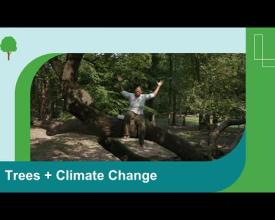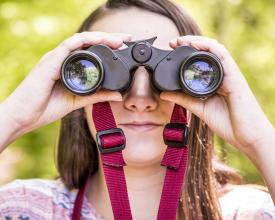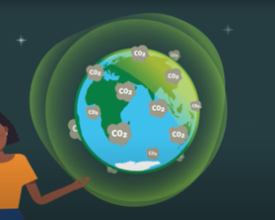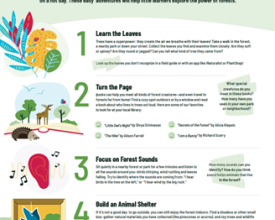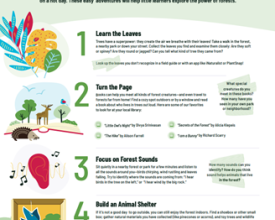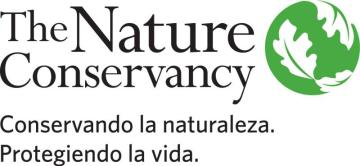
The Nature Conservancy’s Nature Lab
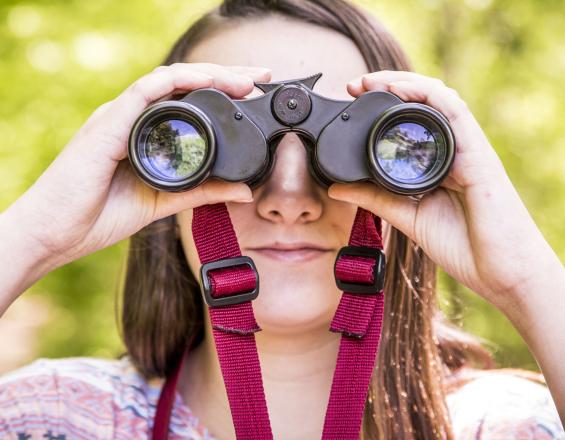
The challenges of biodiversity loss and climate change are here now, and they’re impacting people and nature across the globe. Educators, parents and caregivers need ways to not only teach young learners about these challenges, but to show how they can be part of the solution the Earth needs. That’s why The Nature Conservancy (TNC) and its 1000+ scientists created the award-winning online learning platform, Nature Lab, to leverage technology to bring conservation to life in classrooms, home settings and more. Nature Lab has addressed the education challenges of inequality in access and participation, limited or inaccessible resources, and infrastructure and technology development. Nature Lab helps K-12 students experience the wonders of nature, learn about places and people around the world, and see how they can take action for the challenges facing the planet. High-quality videos transport students to diverse landscapes and interviews with renowned scientists offer youth a chance to see themselves as agents of change.
Context
Challenges addressed
According to a 2022 poll by NPR/Ipsos, 86% of teachers in the United States think climate change should be taught in school, but nearly 60% of teachers do not teach or talk to their students about it because they feel unprepared to do so or they don’t see how to fit climate lessons into the academic subjects they teach. In addition, 80% of U.S. parents support schools teaching about climate change. Nature Lab was designed to meet this need.
TNC’s Nature Lab has addressed the following challenges in education: inequality in access and participation, limited or inaccessible resources, and infrastructure and technology development. Nature Lab’s online platform has provided free access to climate science resources in support of teaching about climate change and equipping students with resources to create solutions to local and global environmental problems.
Location
Process
Summary of the process
Developing partnerships and creating digital resources work together to support the success of Nature Lab. By forming strategic partnerships, Nature Lab can expand its reach, hosting resources on partner platforms and promoting them during key environmental awareness events. These collaborations also help co-create new, engaging resources that align with both partner’s goals and the needs of target audience members. The synergy between partnerships and resource creation has been essential to Nature Lab's growth, enhancing both the platform's impact and its ability to engage a growing audience since its launch in 2020.
Building Blocks
Developing high-quality digital learning resources
Nature Lab’s curriculum includes a collection of virtual field trips, teaching guides for educators, and seasonal activity guides for families with children ages 5 to 11. Virtual field trips allow students to explore diverse ecosystems—such as forests, wetlands, oceans, and urban environments—through high quality videos and structured learning experiences. Each virtual field trip is accompanied by a teaching guide with activities that encourage observation, inquiry, and provide connections to real-world environmental issues.
Nature Lab’s teaching guides provide ready-to-use lesson plans and student resources that bring nature-based learning into classrooms, supporting a wide range of environmental science topics. These materials are designed to help students build critical thinking skills, deepen their understanding of environmental science topics, and recognize their role in protecting the planet.
In addition, seasonal activity guides empower families to connect with nature through simple, locally relevant experiences that foster curiosity, creativity, and environmental awareness in everyday life. Together, these resources aim to make nature education accessible to all learners and support the development of the next generation of environmental stewards.
Enabling factors
Successful collaborations with our internal video team are essential for producing high-quality virtual field trips. Through their network, we engage animation and video production experts to create impactful visual resources. By aligning lesson plans with NGSS standards, we ensure that Nature Lab materials are relevant across diverse educational settings. Additionally, outreach, promotional campaigns, and partnerships are key drivers in expanding the platform's reach and increasing awareness of the resources.
Lesson learned
Through our video production process, we've learned that successful projects require early planning and collaboration with both production and subject matter experts. By involving the right teams from the start, we ensure smoother development and a stronger final product. Flexibility is key, as content and scripts can evolve over time. Additionally, nature-focused videos benefit from careful consideration of outdoor conditions, including weather and seasonal timing.
We also learned the importance of selecting the right video-sharing platform. While YouTube is widely used, it may be blocked in schools, so alternative platforms like Vimeo or hosting videos directly on a landing page offer better accessibility for educators.
When creating digital teaching resources, we recognized the need for ongoing maintenance. PDFs are convenient but can present challenges when updates are necessary, as changes require reloading the resource. Regular checks for broken links and ensuring easy access for teachers are essential for keeping resources up to date.
Development of marquee collaborations and partnerships with partners
Establishing several multi-year partnerships has exponentially increased Nature Lab’s reach since 2020. Content partnerships extend the reach of Nature Lab’s resources, while marquee collaborations offer both reach and opportunities for co-creation, resulting in compelling conservation-focused educational resources for young people.
Nature Lab partners with a number of education-focused learning platforms such as: Kahoot!, PBS Learning Media, Google Arts & Culture, Share My Lesson, Subject to Climate, Mizzen Education, and CLEAN (Climate Literacy and Energy Awareness Network). Nature Lab has also partnered with companies such as Viacom, TedEd, and Netflix, which have supported the growth and reach of the platform.
Nature Lab has developed partnerships in several ways, through external outreach initiatives and through TNC’s name and network as one of the most effective and wide-reaching environmental organizations in the world.
Enabling factors
Strong communication with partners has been essential for fostering long-term collaborations. Establishing multi-year partnerships has played a key role in strengthening Nature Lab’s brand and credibility as a trusted, high-quality open-access education platform.
Lesson learned
Through our experience establishing external partnerships, we've learned that consistent communication is key to long-term success, especially given the shifting priorities, staffing changes, and set capacity of partner organizations. We've found that flexibility and openness to compromise are essential when aligning content to meet the goals of both organizations. We've also become more adept at navigating contracts and formal agreements, adjusting timelines as needed.
Impacts
Nature Lab brings engaging conservation education to students of all ages and backgrounds—online, for free. Since its launch in 2019, TNC has amplified Nature Lab's reach, which supported the platform's growth. Through marquee collaborations with companies such as Viacom, TedEd, and Netflix, hosting educational content partners, and internal reach within TNC, the platform currently reaches over 5.5 million users each year. Users of the platform include formal and informal educators, parents, caregivers, homeschool families, and students. In 2024, Nature Lab was awarded Gold status by the Anthem Awards, which honor the purpose and mission-driven work of people, companies and organizations worldwide.
Beneficiaries
Nature Lab creates immersive high-quality videos and teaching resources designed for formal and informal educators, homeschooling families, after school practitioners, parents and caregivers.
Global Biodiversity Framework (GBF)
Sustainable Development Goals
Story
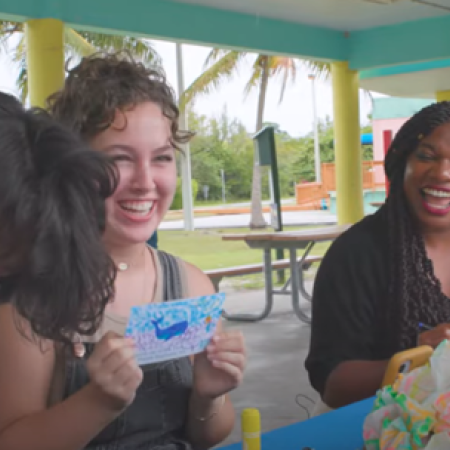
The Nature Lab brand and platform launched in 2020, evolving from previous educational content TNC had produced. Researchers from New Knowledge Organization Ltd surveyed teachers and students and led in-depth case studies at schools across the U.S., including student focus groups and teacher interviews, about TNC’s nature-focused videos and lesson plans. According to the teacher survey results, between 51% and 68% of teachers felt the use of TNC’s educational materials contributed to their self-efficacy in engaging their students. Even more teachers (71%) felt the content helped them facilitate students’ skill development and systems thinking.
Teachers highlighted that the materials were particularly effective in helping students grasp complex natural processes and, importantly, understand the interconnectedness of nature. Similarly, students reported that recognizing these connections encouraged them to adopt pro-environmental behaviors, such as reducing energy use at home and participating in community environmental actions. Survey results further showed that the interactive materials and garden-based lessons significantly enhanced students' engagement with science learning by encouraging them to explore nature, make observations, and interpret data.
Building on this research, TNC launched Nature Lab: an open-access curriculum platform designed to expose young people to environmental issues at both global and local levels. Aligned with Next Generation Science Standards, Nature Lab houses NWE’s original resources alongside a growing collection of virtual teaching materials, lesson plans, and family-focused activity guides—empowering the next generation of environmental stewards and leaders.
